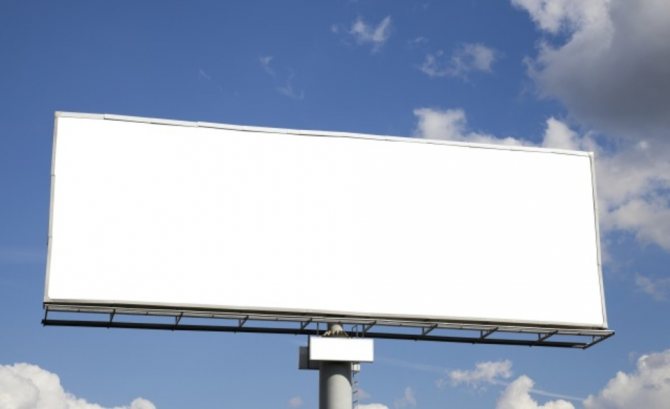Details Published: 01/21/2020 08:23
Since the appearance of advertising messages, people have noted the dishonesty of some advertisers. In order to attract attention to their products, they often embellished or even lied about product data. This was done for obvious reasons: they wanted to sell goods more profitably, beat competitors, and give products non-existent properties and advantages.
False advertising is statements or offers that mislead consumers.
Be sure to read the Advertising Law 2020 in the latest edition with amendments and additions.
False advertising still exists today. But formats and types of inauthenticity have expanded their boundaries. Many strive not only to give their products properties that are not available, but also to belittle the products of competitors.
You will be interested to know what advertising is prohibited in Russia.
Advertising in Russia
Advertising products are informational information distributed in special forms using any available means. Such information can be addressed to an indefinite number of people in order to attract their attention to the necessary object. Advertising creates or develops people's interest in a product or service. This helps increase supply and demand.
Advertising products are produced by three parties: the advertiser, the manufacturer and the distributor. Persons whose attention was drawn to the object of advertising are called consumers. The quality of the formation and distribution of advertising is monitored by the Federal Antimonopoly Service (FAS).
In Russia, advertising is regulated by the Federal Law of the same name (FZ-38 of March 13, 2006). It describes the main forms of advertising products. A separate chapter includes rules on protecting consumers from false advertising. This is the name given to warning information that does not comply with the requirements of Russian legislation.
How does the consumer feel in self-isolation?
Any economic crisis leads to changes in the purchasing habits of Russians. General levels of anxiety increase, purchasing power decreases, and previously effective advertising methods no longer work. The coronavirus pandemic was no exception, and changes in consumer lifestyles were very evident:
- More than half of Russians observed the self-isolation regime
- 32% of people began to clean their home more often and wash their hands regularly
- The intensity and duration of online content consumption has increased
- Russians are increasingly saving money for emergencies
- More and more people are noticing signs of quarantine depression: depression, anxiety, loss of strength and apathy.
50% of respondents in Russia felt an increase in anxiety associated with coronavirus. They were most often worried about the possible loss of a job or a decrease in income, and these worries were not unfounded. In addition, people are worried about the health of themselves and their loved ones—65% of respondents were afraid of contracting the coronavirus.
The concept of false advertising
In a state with a market economy there is always a lot of goods and services. It is not so easy for a manufacturer entering the market to stand out among numerous competitors. It is necessary to come up with new ways to show yourself in the right light. This is often difficult and sometimes even impossible. Entrepreneurs who do not want to pore over the quality of their products and their competent positioning decide to neglect the trust of customers. They take a detour and use an elementary method of attracting attention: false advertising.

Wanting to achieve success without proper effort, manufacturers deceive their own customers. They hide the shortcomings of their products or significantly exaggerate the existing advantages. This approach is illegal. This is evidenced by the articles on unfair advertising in Federal Law No. 38 of 2006.
Competition is a useful and popular phenomenon. It remains so as long as it is controlled by the law. As soon as competition goes beyond legal boundaries, economic chaos begins. Information promoting a particular product is aimed at developing healthy competition. However, unfair advertising gives rise to illegal struggle. This is indicated by many examples from life, which we will examine later. First, you should understand the forms of false advertising and their characteristics.
Unfair competition
You can’t just write that the company is the best, the first, the most and No. 1.
Banned are “the lowest prices,” “the most fashionable dresses,” and “the most professional craftsmen.” The superlative or comparative degree in advertising is a marker of unfair competition. Text that says that a company or product is better than others on the market is punishable by the FAS. For example, Tinkoff’s “Best Cashback Card” faces a fine of 100 thousand to 500 thousand rubles.
If you really want to
It is imperative to indicate specific characteristics or comparison parameters that have clear documented evidence, and mention this evidence. For example, a study, survey or expert opinion that is available for public viewing.
In general, advertising in which a company evaluates itself in superlatives is similar to liking oneself.
Features of illegal advertising
The law on false advertising establishes rules that make it possible to distinguish correct information from illegal information. The first sign of false advertising is the presence of false information about the product. For example, a product being released can be compared with an already sold analogue from another company.
The second feature of illegal advertising is that it puts a competitor in a bad light. No company should discredit the professional reputation, honor and dignity of its colleagues. It is prohibited to disparage the merits of competitors. For example, a manufacturer who claims their product is the best among analogues must prove this in detail.
You cannot advertise prohibited goods or those products whose promotion is not allowed in certain places. Indirect advertising of prohibited products is also prohibited. Such actions will be regarded as illegal PR.

The law places a taboo on incorrect comparisons of products with competitive analogues. Thus, manufacturers often use the technique of comparing “exceptional” and “best” products with “ordinary” analogues. Advertisers noticeably disparage other manufacturers, making them look bad. Essentially, they are telling customers that “other companies make inferior products,” which is most likely not true.
Thus, advertising company employees must be very careful in promoting a particular product. They must find a fine line: when the product is shown in the best light, but no one has broken the law.
Misleading advertising
The domestic advertising law recognizes as improper advertising advertising that is unfair and unreliable. Unfair advertising is advertising that is actually an act of unfair competition, and false advertising is advertising that contains any false information related to the object of advertising and/or the advertiser.
Meanwhile, an analysis of the advertising law allows us to conclude that there is another type of inappropriate advertising - advertising that misleads consumers.
Such advertising includes advertising that lacks some essential information (Part 7, Article 5 of the Advertising Law), as well as advertising using foreign words (Clause 1, Part 5, Article 5 of the Advertising Law). Before analyzing each of these compounds, it is necessary to define the concept of “misconception.”
Delusion should be understood as an inadequate reflection of reality, the formation of a false idea, conditioned at any given moment by the limitations of socio-historical practice and knowledge, as well as by the absolutization of existing views, techniques, and approaches. From an epistemological point of view, the concept of error captures a state of knowledge that is qualitatively different from both truth and falsehood.
Accordingly, misleading advertising should be understood as advertising that creates a distorted impression in the consumer about the object of advertising.
Misleading advertising must be distinguished from false advertising. Thus, unreliable advertising must necessarily contain unreliable information, while misleading advertising, as a rule, does not contain unreliable information; it only conceals part of the information that does not allow the consumer to form a correct idea about the object of advertising.
The main tool for misleading, as a rule, is the dissemination of inaccurate information due to the concealment of some essential information. Misleading advertising does not convey “objectively incorrect (incorrect) information,” but subjectively incorrect information, i.e. those that are capable of misleading.
This means that when assessing whether an advertisement is misleading, the subjective perception of what it conveys is taken into account. The determining factor in this case is not what the advertiser had in mind, and not how much the reported information corresponds to the truth, but only their perception by consumers.
At the same time, it is important to understand that the consumer may be in a state of confusion not only as a result of the actions of the advertiser, but also as a result of personal characteristics, for example, due to a lack of necessary knowledge to correctly perceive information.
The situation when a consumer is misled by advertising as a result of the actions of the advertiser is described in Part 7 of Art. 5 of the Law on Advertising, according to which advertising is not allowed if it lacks some essential information about the advertised product, the conditions for its acquisition or use, if this distorts the meaning of the information and misleads consumers of advertising.
The advertising law does not disclose the concept of “material information,” but an analysis of judicial practice leads to the following conclusions:
— the advertising law does not require the indication of all essential information, but obliges the consumer to form a correct (reliable) idea about the relevant product (work, service) [1];
— significant is not only information that is attractive to the consumer, but also information that can deceive the expectations formed among consumers by such advertising[2].
- advertising should not contain all the information about a specific advertising product, but only its essential components, named in legislative acts; brevity of the advertising content is acceptable, but provided that the advertising does not create illusions about the advertised product (service) and the procedure for its acquisition (use) in order to attract consumer interest[3].
Thus, “essential information” should be understood as that information that forms the consumer’s correct understanding of the object of advertising. At the same time, the consumer, when choosing a product through the perception of advertising, makes his choice based on the most understandable and most necessary information in his understanding.
The fact of misleading the consumer can only be established when the consumer, having contacted the advertiser, does not receive what he expected when responding to the advertising offer.
Thus, the provider company, in advertising its services for unlimited Internet access, offered to connect to the Internet before December 31 on a payment terms of 167 rubles per month. The specified subscription fee was established by orders of the company as part of a special promotion (in a special tariff plan) in order to increase sales of the company's services.
According to the terms of the promotion, during the period from September 3 to December 31, customers connecting to the Internet were given the opportunity to conclude contracts under a special tariff plan with a subscription fee of 167 rubles per month. After three months from the moment of connection to a special tariff plan, the subscriber, if he has not switched to one of the existing tariff plans, is automatically transferred to the tariff plan with the minimum cost.
According to the company's price list, the Internet data transfer service consists of a number of tariff plans with an unlimited amount of traffic and monthly payments from 297 to 1057 rubles, depending on the data transfer speed.
Thus, the fee for unlimited Internet access services increases after three months from the moment the subscriber connects under the terms of a special tariff plan, and its minimum amount is 297 rubles.
The advertisement indicates the size of the subscription fee - 167 rubles, but does not indicate the condition for changing it after three months. However, such information is part of the essential information about the cost of the service, and its absence distorts the meaning of advertising and misleads consumers regarding the actual amount of costs that the subscriber will incur.
The obligation to prove the fact of misleading the consumer is another significant feature that distinguishes commented advertising from false advertising, for which to recognize as improper it is enough to establish the fact that there is false information in the advertising (clause 6 of the Resolution of the Plenum of the Supreme Arbitration Court of the Russian Federation No. 58), while it is not necessary to proceed from the perception of the disseminated information by all persons to whom the advertisement is addressed, and, therefore, find out it.
However, the perception of one particular consumer may not always be the basis for qualifying an advertisement as misleading. The sufficient significance of the sample should be differentiated depending on the specific situation, taking into account the interests of market participants and the normal state of affairs.
At the same time, antimonopoly authorities in most cases proceed from the fact that the phrases used in advertising information are interpreted literally by the average consumer of advertising. The consumer does not have the obligation to analyze the advertisement or verify the accuracy and sufficiency of the information stated in it. This approach is supported, among other things, by the courts, so the Supreme Arbitration Court of the Russian Federation in paragraph 28 of the Resolution of the Supreme Arbitration Court of the Russian Federation No. 58 of the Supreme Arbitration Court of the Russian Federation indicated that advertising is assessed from the position of an ordinary consumer who does not have special knowledge.
That is, the courts and antimonopoly authorities protect the “gullible consumer” when placing advertisements (consumer standards will be discussed in more detail below).
It should be noted that today this norm has become universal for antimonopoly authorities, and almost every violation of the advertising law is classified as a violation of Part 7 of Art. 5 of the Law on Advertising.
However, such a qualification may not always be supported by the court without examining the issue of misleading the consumer. Thus, in the carriage of the Novosibirsk metro train the following information was placed: “Marseille _ house on the embankment _ JSC Beregovoe.” MORTGAGE 11.95 _ Developer of the Marseille residential complex. Project declaration on the website: www.dom-marseille.rf Mortgage is provided by Sberbank of Russia. General license for banking operations dated August 8, 2012. Registration number - 1481. _ 319-87-87_ www.dom-marseille.rf.”
Based on the results of the consideration of this case, the antimonopoly authority issued a decision dated December 4, 2015 N 103/15, which is contested by the applicant in terms of recognizing him as having violated Part 1 of Art. 28 of the Law on Advertising. Refusing to satisfy the company's request to invalidate the decision in this part, the first and appellate courts concluded that there was a violation of Part 1 of Art. in the actions of SibNeon LLC. 28 of the Law on Advertising.
At the same time, the courts proceeded from the fact that a company name is a means of individualizing a legal entity, therefore, indicating in an advertisement only part of the name of a financial organization without indicating the legal form cannot be recognized as providing consumers with adequate information about the person providing financial services.
The cassation court overturned these decisions, indicating that, in accordance with Part 7 of Art. 5 of the Law on Advertising, advertising that lacks some essential information about the advertised product, the conditions for its acquisition or use, is not allowed, if this distorts the meaning of the information and misleads consumers of advertising.
In this case, the name of the credit institution - Sberbank of Russia, which is the largest and widely known credit institution in Russia, is reflected in the controversial advertisement in a commonly used form that is understandable to the average consumer.
Thus, the absence in the controversial advertisement of an indication of the organizational and legal form of this credit institution does not distort the meaning of the information and does not lead to misleading consumers, since the information about the provision of a mortgage loan by the specified organization is reliable and understandable to the consumer[4].
The most striking precedents for violation of Part 7 of Art. 5 of the Law on Advertising is advertising of financial services in which advertisers deliberately remain silent about the conditions for the provision of the relevant financial services. Let's look at a fairly typical example, which will make the general concept of these violations clear.
Thus, in the course of carrying out the state function of supervision in the field of advertising, employees of the Krasnoyarsk OFAS Russia discovered the distribution on page B32 of the newspaper “Today’s newspaper - Krasnoyarsk-26” No. 25 (1107) dated 06/30/2016 of the following information: “... KPK “S”... We accept savings up to 20.6% per annum!… Kurchatova Ave., 3/1 TC “Constellation” <…>…” (hereinafter referred to as Advertising).
The advertisement in question does not contain all the conditions that affect the amount of income that those who use the services will receive, namely the maximum interest rate - 20.6, while other conditions are not specified. Other conditions that affect the amount of income that persons using the services will receive are essential information, the absence of which may mislead potential consumers of Advertising.
By virtue of Part 7 of Art. 5 of the Law on Advertising, advertising that lacks some essential information about the advertised product, the conditions for its acquisition or use, is not allowed, if this distorts the meaning of the information and misleads consumers of advertising.
Thus, the Advertising in question contains signs of violation of the requirements of Part 7 of Art. 5 of the Law on Advertising[5].
It is also curious that the courts and antimonopoly authorities, in order to combat such a technique as “small print in advertising,” decided to use precisely the provisions of Part 7 of Art. 5 of the Law on Advertising.
Thus, in paragraph 28 of the Resolution of the Plenum No. 58, the Supreme Arbitration Court of the Russian Federation indicated that the advertiser has the right to choose the form, method and means of advertising his product. However, at the same time, he must comply with the mandatory requirements of the Advertising Law for advertising, in particular the inclusion in advertising of warning notices, mandatory information or terms of service.
Therefore, if information is depicted in such a way that it is not perceived or poorly perceived by the consumer (font size, color scheme, etc.), and this circumstance leads to a distortion of its meaning and misleads advertising consumers, then this information is considered missing, and the corresponding advertisement is improper due to the fact that it does not contain some essential information about the advertised product, the conditions for its purchase or use, Part 7 of Art. 5 of the Law on Advertising).
Speaking about misleading the consumer by advertising due to his lack of special knowledge, it is necessary to comment on the provisions of clause 1, part 5, art. 5 of the Law on Advertising, according to which in advertising the use of foreign words and expressions that can lead to a distortion of the meaning of information.
That is, this norm is based on the fact that the use of foreign words in advertising is allowed, but their use should not mislead the consumer, that is, it is necessary to distinguish the situation when the consumer, due to lack of knowledge of a foreign language, cannot perceive the advertising message at all, from the situation where when a consumer, having even a minimal level of knowledge, perceives an advertising message and it misleads him.
The conclusion is that in order to qualify advertising as improper under clause 1, part 5, art. 5 of the Law on Advertising, it is necessary to establish the fact of misleading the consumer, so in Resolution 1AAC dated January 23, 2012 in this case, it is stated that when making a decision, the court was based on the fact that the use of terms in a foreign language “FAST MONEY” (as the advertiser called his financial service - issuing a microloan) in the absence of text in Russian distorted the meaning of information for advertising consumers who speak a foreign language. While the consumer must consciously perceive and analyze the information communicated by advertising, that is, there is a violation of clause 1, part 5 of Art. 5 of the Law on Advertising.
The Court of Appeal cannot agree with this conclusion, since the Advertising Law does not directly prohibit the use of foreign words in advertising. The restriction concerns situations in which non-Russian words and expressions change the perception of meaning and can be misleading.
The administrative body did not provide evidence (survey results, expert research, etc.) that the foreign words used in the advertising distributed by the cooperative led to a distortion of the meaning of the information. Thus, the conclusion of the antimonopoly authority and the arbitration court of the first instance was recognized as incorrect.
In another case No. A48-574/2016, the Oryol Arbitration also came to the conclusion that since the foreign words used in advertising did not lead to distortion of information, then, accordingly, there was no violation. The court made this conclusion based on the results of a survey conducted by one of the Oryol universities.
Thus, the following conclusions can be formulated:
- misleading advertising is a type of inappropriate advertising, which is advertising that contains incomplete or inaccurate information, as a result of which the consumer forms a distorted idea of the object of advertising. At the same time, when qualifying advertising as misleading, the antimonopoly authority must prove the fact of misleading consumers.
An advertisement cannot be considered misleading if it was missing some essential information, but the consumer still received what he expected when responding to the advertising message.
*If you have any questions about this article or related issues of legal regulation of advertising, you can write to me at.
More useful, practical materials on advertising law in my book “Laws of Advertising. Right for Marketing."
[1] Resolution of the Federal Antimonopoly Service of the West Siberian District in case No. A45-21092/2010;
[2] Letter of the Federal Antimonopoly Service of Russia dated August 13, 2010 N AK/26483;
[3] Resolution 12 of the Arbitration Court of Appeal dated June 25, 2014 in case No. A12-4390/2014.
[4] Resolution of the Arbitration Court of the West Siberian District dated November 18, 2016 N F04-4572/2016 in case N A45-2281/2016;
[5] Decision of the Krasnoyarsk OFAS Russia dated September 23, 2016 in case No. 291
Umbrella and defamatory advertising
Umbrella advertising is probably the most sophisticated form of information promotion. Prohibited goods or services are advertised under the guise of a similar product or a similar trademark. Because of this, the buyer makes an association not with the official product, but with a well-known product that is prohibited from promotion.
Most often, the umbrella advertising method is used by manufacturers of tobacco and alcohol products. As you know, it is prohibited to advertise cigarettes and alcoholic beverages. To remind themselves, manufacturers pay for PR to other companies, but on the condition that their trademark will still appear in front of buyers.

The next type of unfair advertising is called defamatory. Everything is simple here: the developed information material calls into question the authority, honesty or benevolence of individuals. Moreover, these may not necessarily be competitors. For example, comedy commercials may make fun of a person or group of people. Moreover, some PR people allow themselves to discredit those who do not use the services of a particular company. Such acts are considered offensive and are therefore prohibited. In accordance with the provisions of the law, any manifestation of unfair and unreliable advertising is subject to a fine.
Advertising of alcohol and tobacco products
Such advertising is prohibited.
Neither “foamy”, nor “sparkling”, nor “hoppy”, nor Heineken. The inclusion of any alcoholic beverages or euphemisms in advertising is prohibited and is regarded as advertising of alcohol. Even non-alcoholic products are prohibited in online advertising. Thus, Afisha was fined 100 thousand for advertising Jameson whiskey on its website.
No hookahs or cigarettes. And also pipes, cigarette paper, lighters and smoking processes. Steam cocktails are also questionable, so it’s better not to risk it. A hookah bar in Orenburg was fined 13 thousand rubles; for advertising on the Internet, the fine will be higher.
If you really want to
You can write “drinks”, “mug”, for example. Only without images of alcohol or hookah.
Incorrect comparison
The lion's share of advertising products is comparative in nature. Most such advertising is prohibited. The point is that the comparison must be correct, with indications of accurate data. Many workers in the field of PR technologies do not know or do not want to know. They enter into a tense race for leadership and try to win it with all their might. However, it is not easy. If the quality of the product is the same as that of competitive analogues, then you will have to fight for buyers. You can run a memorable and creative advertising campaign. But will the ends justify the means? Advertisers are unwilling to take financial risks, and therefore often take the slippery slope of breaking the law.

No one will dare to show a competing company in their advertising. This will cause mixed reactions from the audience. PR workers know this, and therefore invent indirect comparison options. They compare the advertised product with “other” or “ordinary” products. Thus, they significantly lower the authority of other manufacturers. Any incorrect comparison, including an unconscious one, is taboo. But does this mean that comparative advertising is prohibited in principle?
Some manufacturers still manage to circumvent the requirements of the Federal Antimonopoly Service and the law. The secret is that linguists or people who know the Russian language better than others take on the production of advertising. Thus, there is a difference in the phrases “best of its kind” and “unique in the line”, and a significant one. When a product is called the best, it requires proof. The manufacturer is obliged to indicate in the characteristics of the product information indicating that the product is unsurpassed. If the object of advertising is called “unique,” then problems may not arise. Thus, a product may be unique in one particular property, but not the best in general.
Totally banned
Esoteric goods, bookmakers, lotteries, erotic goods.
And also advertising that encourages the commission of illegal actions, calling for violence and cruelty; pornography, drugs, explosives. Advertising that uses obscene and offensive images, comparisons and expressions in relation to gender, race, nationality, profession, social category, age, language of a person and citizen, official state, religious symbols, objects of cultural heritage of the peoples of the Russian Federation, and objects of cultural heritage, included in the World Heritage List. It is better to look at the entire list in Article 7 of the law.
Two of dozens of examples of such violations:
- FAS considered the appeal of the ChROPO "Union of Conscripts of Russia" about illegal advertising of legal assistance to conscripts in Yandex.Direct;
- The FAS accused Sports.ru of violating the advertising law due to the bookmaker’s banner.
Copy
It’s worth clarifying right away that copying and plagiarism are not the same categories. Plagiarism is a part of copying, which can come in different forms. In the advertising environment, those who like to profit from old ways of presentation are called “opportunists” or “mimic creatives.” They don’t come up with anything new, they don’t try to fantasize and find better options. Opportunists are characterized by repeating old but successful ideas.
There are four types of mimic advertisers. The first one is known to everyone - he is a plagiarist. It is characterized by accurate reproduction of existing material - without any new ideas or additions. The second type is called a clone. In this case, the manufacturer copies himself. For example, he once made a successful commercial. But instead of developing and coming up with something new, past success.

The last two representatives of the mimic group are not as lazy as those described earlier. They try to dilute the copied material with new ideas and various additions. Thus, those who like to “imitate” form their material, but supplement it with old successful details. There are also “revivalists” - advertisers who borrow a contextual format for their material.
Lovers of “imitation” and “revival” have the easiest time. In the moment of exposure, they can justify themselves by saying that they used references but did not copy anything. However, it should be borne in mind that the court often takes the side of the plaintiffs who filed a complaint for alleged plagiarism. Sometimes, due to the subjective thinking of judges, even correct information can become false advertising. Thus, you will still have to pay the fine.
Advertising distributed over telecommunication networks
In 2014, as many as 47% of all advertising law violations were associated with these intrusive, beeping and vibrating messages received at the most inopportune moment.
Most often, cellular operators or directly advertising distributors are held accountable for this violation, and in the absence of an agreement to place advertising, then advertisers.
The advertising distributor must prove that the consent of a particular subscriber to receive advertising has been obtained. Therefore, companies caught spamming often base their position on obtaining consent through their website, inventing more and more new excuses for themselves.
They don’t even hesitate to retroactively post a user agreement, in which they indicate that every visitor to our site agrees to receive advertising...
Friends, the FAS knows what an Internet archive is and it will not be difficult to look into the past of your commission website, and having discovered its true content at the time the SMS or email was sent, draw the appropriate conclusion.
And by the way, according to the FAS, consent obtained by filling out any forms on sites that do not allow one to clearly establish who exactly agreed to receive advertising is improper and violates the requirements of the law, since it does not allow confirming the will of a particular subscriber to receive advertising from specific advertiser.
False information
An advertisement is considered dishonest if it provides incorrect, unverified or questionable information about a particular product. Thus, the law establishes a ban on incorrect information:
- about the artificial or natural properties of a product, the time or technology of its creation, methods of use or consumption, nuances of operation, etc.;
- about the manufacturer’s pricing policy at the time of the advertising campaign;
- about payment terms;
- about the availability of a product in circulation, its marketability or availability in certain quantities at a specified time and place;
- on the terms of the warranty period and the temporary characteristics of the suitability of the product;
- on the authority to use state or international symbols;
- about statistics presented in such a way as to mislead the audience;
- about the popularity and demand of products;
- about the superiority of the advertised product over other products, etc.
Thus, representatives of PR companies need to try hard to get around all the prohibitions and create a high-quality information product. Often, unfair competition and advertising form on their own, without any effort on the part of specialists.
Hidden and unethical advertising
Advertising should not be ashamed of itself. This is an important rule regulated by law. Any attempt to discreetly convey information to listeners or viewers is prohibited. So, before the start of an advertisement, an insert about its beginning is desirable. The product being positioned must be clearly identified.
Why is hidden advertising prohibited? The law states that any attempts to indirectly convince the buyer of the need for a certain product are negative. This is a prohibited form of advertising. Unscrupulous promoters subtly influence people's perception of reality. Such actions are considered harmful, as proven by psychologists and scientists.

Unethical advertising is considered the most common phenomenon. PR workers, wanting to stand out, resort to humiliation, insults and other “evil” forms of presenting information. The law prohibits advertising information that contains racism, Nazism, various forms of intolerance and discrimination, derogatory statements about people or countries, denigration of official symbols, etc.
Often, advertisers deliberately break the law, trying to achieve publicity and so-called “black PR”. Moreover, they often achieve their goals. People pay attention to the disgraced manufacturer, and therefore demand increases. Of course, not all companies are willing to take such a risk—except the most desperate ones.
False advertising: liability under the law
The Federal Antimonopoly Service (FAS) is responsible for monitoring the activities of unscrupulous advertisers. The authority of this body includes the prevention, detection and termination of violations of the law by individual companies. FAS initiates cases and transfers them to court. This ensures protection against false advertising.
The law establishes different types of penalties for the creation and dissemination of illegal information. All necessary sanctions are enshrined in Article 14.3 of the Code of Administrative Offenses of the Russian Federation - from 2 to 2.5 thousand rubles for citizens and up to 20 thousand rubles for officials. Large companies registered as legal entities must be prepared to fork out up to 500 thousand rubles.

Financial damage that advertising information could cause falls under the category of civil cases. Accordingly, compensation for losses is regulated by Article 15 of the Civil Code of the Russian Federation. The court itself decides how much money the defendant must transfer to the injured person. Lost profits, moral or material damage, etc. are calculated.
Advertising of goods on credit and installments, financial services
If you write the interest rate “from”, then write “to”.
And write down all the conditions for receiving the lowest rate. You also need information about the name and legal form of the bank, and an indication that loan services are provided by this bank, and the license number.
Be sure to provide the advertiser with a certified copy of the bank’s license.
A bad example: the Federal Antimonopoly Service fined Google 150 thousand and Mail.ru 100 thousand rubles for distributing advertising in Google AdWords and myTarget for deposits provided by RUSKREDIT LLC without a license.
If you really want to
Include expenses in the amount of 150 thousand rubles in the budget for fines.
Real cases of false advertising in Russia
Domestic companies often violate Russian legislation when promoting their products. There are incredibly many examples of false advertising. Let's start with an illustration of typical mimicry. Few people know that the music insert “Retro FM” completely copies the music of Fnac Music Store, a company that produces vinyl records. This is a case of “revival”, and therefore nothing happened to the famous radio station.
There have also been cases of broadcasting unethical advertising in Russia. However, their number is not as large as in the West, where issues of tolerance are especially acute. Nevertheless, it is still worth talking about one outrageous situation in our country. Eccentric businessman German Sterligov often attracted attention through homophobic and derogatory statements. So, for a long time there was a sign on the window of his store in St. Petersburg with the inscription “F****** [homosexuals] are not allowed in.” The prosecutor's office ordered the sign to be removed. The situation itself can well be called an example of unethical and hidden advertising.
The following situation illustrates the provision of false information. In the fall of 2014, she advertised the Megafon Login 3 tablet allegedly for 1,990 rubles. However, in most stores the real cost of the gadget was at least 3,790 rubles. FAS fined the company.
A very egregious incident occurred with Gazprom. The head of the FAS, Igor Artemyev, suddenly considered the company’s slogan, which it had been using for more than 13 years, illegal. The fact is that Gazprom positioned itself as a “national treasure.” Many politicians did not like this. The wealth of a nation is its nature, freedom, beauty, traditions, family and much more, but not the gas company. Gazprom agreed with the comments and removed the famous slogan from circulation.
Is it worth playing on consumer feelings?
COVID-19 has opened up abscesses in society and the economy not only at the macro level of countries around the world. Internal problems, unfinished work, brewing conflicts in the company - all this surfaced with the onset of the pandemic. The situation was aggravated by the fact that the solvency of clients simultaneously decreased and the business was left without its previous income, which could help solve its main problems.
In such conditions, it can be very difficult to refuse the temptation and not promote products with the help of coronavirus and everything connected with it. Could this work? Yes, but in a very short term. This will be followed by a reputational crisis and even problems with the law. It is impossible to legally establish the threshold after which advertising will be considered a malicious manipulation for the purpose of profit, so small and large companies often take advantage of this.

You can try to circumvent the law, avoid fines and start making additional profits during this period. It certainly succeeded, which since the beginning of the pandemic has been positioned as a cure for coronavirus. But in the long term, the brand will have a very long time to restore its reputation and customer trust.





